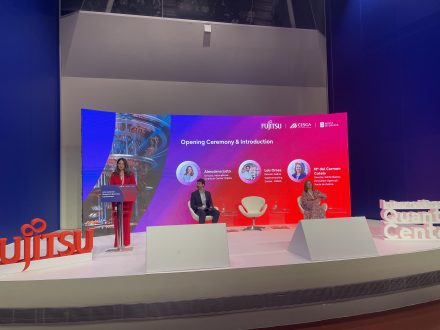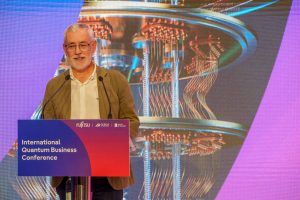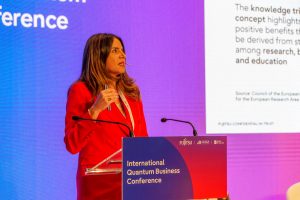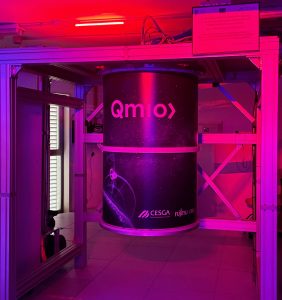Fujitsu Showcases Quantum Galicia at International Quantum Business Conference

The conference analysed topics such as the power that Galicia and along with it, Spain and Europe have to lead the development of quantum computing, as well as the importance of collaboration, investment and talent.
‘Galicia sounds like quantum’. These words from Carmen Cotelo Queijo, director of the Galicia Innovation Agency could well sum up what Santiago de Compostela hosted yesterday as part of the first edition of the International Quantum Business, organised by Fujitsu in collaboration with the Galician Supercomputing Centre (Cesga) and the Xunta de Galicia.
A conference that brought together nearly 300 people and from which the main conclusions that could be drawn are the power that Galicia and with it, Spain and Europe have to lead the development of quantum computing as well as the importance of collaboration, investment and talent so that this possibility can go from possible to real.
As practically all the participants in the conference pointed out, quantum computing is a highly promising technology that has a long way to go. That is why it is important to bet on it now and not miss the train, said Gonzalo Romeo Martínez, general manager of Platform Business Spain at Fujitsu Spain. For Romeo, there are pioneering companies in Europe in this technology that could put us in an advantageous position compared to countries such as the United States or China.

The quantum race
Shintaro Sato, SVP and Head of Quantum Laboratory at Fujitsu Research, also expressed this view, stating that ‘right now it’s true that the US is in the lead, but this is a long-term race. Anything can happen because there are many technologies involved, so the Americans are focusing on everything related to semiconductors but not on neutral atom research, for example.
Sato further explained where Fujitsu is focusing its developments and how it is focusing on quantum error correction and developing end-user applications through its hybrid quantum computing platform.
On the hardware side, according to Sato, they could launch 256-qubit superconducting quantum computers (in 2025) and over a thousand qubits in 2026.
What no one doubts is the strategic importance of quantum switching, which, as the director of Fujitsu’s International Quantum Centre, Almudena Justo Martínez, pointed out, could contribute up to 850 billion euros to the European economy in the next 15 to 30 years, according to the report ‘The future of European competitiveness’, prepared by the former president of the Central Bank Mario Draghi.

‘Quantum computing is going to be a revolution as it will allow us to solve problems that cannot be solved today, as well as reducing calculation and computation times and, therefore, energy consumption,’ said Almudena Justo, who also wanted to highlight the importance of creating an ecosystem around this technology that involves companies, researchers and the academic world.
Fujitsu’s International Quantum Center, also located in Santiago de Compostela, ‘is a tool to accelerate the arrival of quantum tools on the market, bring this technology closer to companies and create that much-needed collaborative ecosystem’.
Galicia Innovation Agency is well aware of the importance of joining forces and collaborating. ‘Santiago de Compostela is the end of the road; today, however, with this conference, it becomes the beginning of a community,’ said its director Carmen Cotelo.
For her, identifying the challenges of quantum computing is as essential as government support and public-private collaboration, of which this event is a perfect example.
A benchmark region
The holding of the International Quantum Business in Santiago de Compostela is no coincidence, nor is Fujitsu’s role in this initiative. Thus, explained Gonzalo Romeo, the company chose to recover its presence in Galicia with quantum computing as a way, to position itself again in the region but also to centralise Fujitsu’s resources in this technology for the whole of Europe.

A choice that had a lot to do with the Galician Supercomputing Centre (Cesga), which since 2015 began research into quantum computing and which in 2023, together with Fujitsu, inaugurated the Qmio, which, with 32 qubits, ‘is the most powerful quantum computer in a public institution in southern Europe’.
‘Quantum is an up and coming technology, but there is still a long way to go, many obstacles to be overcome. There are still many steps to be taken to make quantum truly practical, with a real return. That is why, if we want to achieve this, it is very important to invest in knowledge, in research and training people. The difficult thing is to get on a train that is already on the move, as has happened in Europe with Artificial Intelligence; you have to be there from the beginning and that is what we are doing at Cesga,’ said Lois Orosa, managing director of the Centre.